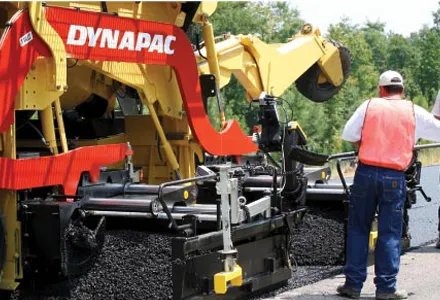
A third trial of Iterchimica’s graphene enhanced Gipave technology is underway in Oxfordshire UK. Contractor Milestone Infrastructure laid a 725m-stretch on North Street in Middle Barton, a busy B-road which runs through the village in West Oxfordshire.
“Our network is open to new things,” said Oxfordshire County Council’s head of highway network, Sean Rooney. “The things we are trialling today will lead to us doing things more efficiently and effectively in the future. If we want to move forward, we have to do things differently.”
The first trial of Gi Pave, which deploys an additive containing hard-to-recycle plastics and graphene, took place in 2019 in the village of Curbridge, comparing the performance of a mix containing Gipave with a mix made with standard bitumen. Falling Weight Deflectometer (FWD) tests carried on the road surface at the end of 2022, yielded some very positive results, according to Raven.
“It's early days, but when we did the analysis of the FWD testing, the test results were better than we had expected,” said Phillip Raven, technical director of the council’s maintenance contractor Milestone Infrastructure. The initial results suggest that the road surface will last 40 years compared to an expected 15 years for a standard mix, that’s a 165% improvement in lifetime.
The second trial, in March 2022, was on a busy B-road and aimed to compare Gipave’s performance with that of a polymer modified bitumen (PMB) from asphalt supplier Aggregate Industries’ high-performance range. Unfortunately, the second trial did not perform as expected, Raven said.
“We had some issues with the production of the material on that site and did not achieve the results we were hoping for from the lab testing,” he said. “We had problems with some of the bitumen grades.”
Although some would see this result as a failure, Rooney had a different take on it: “To fail with a trial is not a failure. The purpose is to learn. As an industry we can be far too risk averse.” So, the third trial will also look to again compare Gipave with PMB, with the bitumen grade issues solved.
The well as the benefits of lower whole life costs, lower whole life carbon emissions, Gipave will lead to less disruption for the people of Oxfordshire, says Rooney: “Usually you have to treat a road between 8 and 10 years after it was laid and then do something more after five years. With Gipave, it's not only the costs you will be saving, there's a benefit to the community and the network users.”
Although GiPave’s carbon footprint up to the point it is laid will not be lower than a warm mix asphalt, since the additive must be used with hot mix, the carbon savings over a 20-year life could come in at 40%, according to the council. As for the initial cost of a Gipave mix compared to a PMB mix, it is not clear yet what the cost in the UK will be. If demand grows sufficiently, Iterchimica could manufacture the additive in the UK, rather than shipping it from Italy.
Once this final trial has been evaluated, Milestone and the council can start to work out what type of mixes should be deployed where around the network. “There’s no reason why we could not use Gipave anywhere where there would be benefit from not closing the road every five years,” he said.
Budget, of course, is an important factor too. “With our client in Oxfordshire, and with all our clients, there has to be a balance of budget pressures versus durability,” said Raven.
Meanwhile, Oxfordshire County Council and Milestone are also carrying out a comparison of seven different pothole repair methods. Methods on trial include cold patching materials, mastic asphalt, Milestone’s favoured Dragon Patcher spray injection patching, JCB’s Pothole Pro, a Bobcat mini planer and gang and Thermal Road Repairs’ technology.
“The pothole trial was the first of its kind in the UK,” said Rooney. “We took a typical road for Oxfordshire, running through the middle of a small town with heavy traffic. Every pothole repair method will experience the same traffic conditions and the same weather conditions.”
“We applied them all on the same stretch of road so that we could monitor the durability,” said Raven. “It also meant that we could showcase different techniques to local councillors.”
Milestone is also using the trial to compare productivity of the various methods. “We repair around 30,000 defects a year,” said Raven. “That equates to a lot of cost and a lot of carbon. If repairs last longer, we can potentially reduce cost and carbon.”
Milestone will be checking in on the performance of the pothole repair methods after three months, six months and a year and will be reporting on progress to other authorities and their contractors through networks such as the Local Council Roads Innovation Group (LCRIG), of which Rooney is a founding council member. It will not be a case of picking a winner, said Raven, but rather having information about a toolbox of techniques so that the right one can be selected for the right circumstances.









